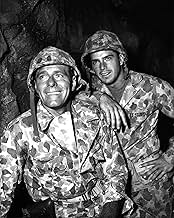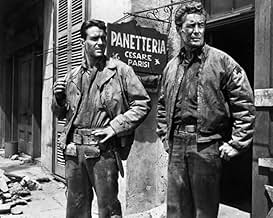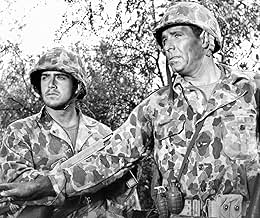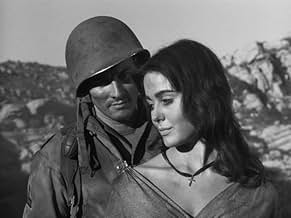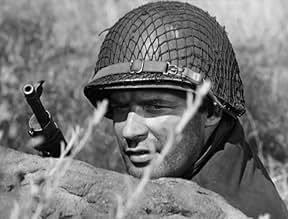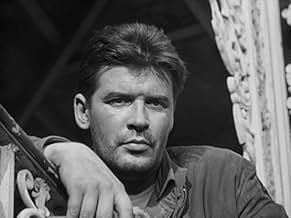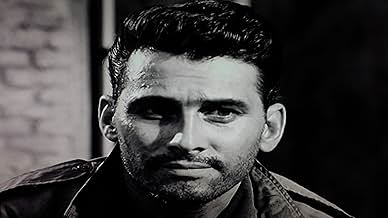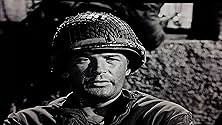A 36ª Infantaria está abrindo caminho pela Itália sob a liderança enérgica do Capitão Jim Benedict. Seus homens incluem o galante D'Angelo, que carrega seu violão, além dos amigos Lucavich e... Ler tudoA 36ª Infantaria está abrindo caminho pela Itália sob a liderança enérgica do Capitão Jim Benedict. Seus homens incluem o galante D'Angelo, que carrega seu violão, além dos amigos Lucavich e Hanson. McKenna é o sargento independente.A 36ª Infantaria está abrindo caminho pela Itália sob a liderança enérgica do Capitão Jim Benedict. Seus homens incluem o galante D'Angelo, que carrega seu violão, além dos amigos Lucavich e Hanson. McKenna é o sargento independente.
Explorar episódios
Avaliações em destaque
I watched this show with my father as a small child. He was a BAR man in an infantry squad. I liked Gallant Men much more than Combat as in Combat, you know the core group would never get killed and the music was very predictable. The Gallant Men was like what my pop experienced he said. Brief intense battles followed by lulls where you tried to find something to do without getting killed. The show gave characters more depth and the battles were more realistic than Combat. The men also appeared at times to really be in fear of their life instead of just acting. I recently acquired the entire series on DVD's and it is even better than I remember it.
The pilot of "Combat" was not as well made as the pilot of "The Gallant Men".
Robert Altman directed the pilot of "The Gallant Men". He was key in casting all the regulars. Boris Sagal ("Rich Man, Poor Man") directed the pilot for "Combat", but never did another episode. The producers of "Combat" hated the look of their pilot and loved the look of the "Gallant Men" pilot. The producers convinced Altman to move over to "Combat" as a producer-writer-director. Altman did some of his best work on the first season of "Combat", and he got the series off to a superb start. Altman says on a "Combat" DVD commentary of an episode with Albert Salmi that he never got better than that as a director. Altman also said that "Combat" had a better cast than "The Gallant Men", even though he cast "The Gallant Men" and had nothing to do with casting "Combat".
"The Gallant Men" was probably suggested by "The Story of G.I. Joe" (1945) where Burgess Meredith played war correspondent Ernie Pyle and Robert Mitchum played an infantry captain. In "The Gallant Men", Robert McQueeney was top billed as war correspondent Conley Wright.
"The Gallant Men" focused on a company while "Combat" focused on a single squad. The squad level turned out to be the ideal vehicle to tell war stories and to allow the viewer to get close to the characters. "Combat" also benefited from having one of the 1960's best series performances: Vic Morrow as Sergeant Saunders. Morrow was nominated for an Emmy for the first season of "Combat", but lost to E.G. Marshall ("The Defenders"). "Combat" also hired superb guest stars that Warner Brothers would never pay up for: Jeffrey Hunter, Lee Marvin, James Coburn, Rip Torn, John Cassavetes and many others. And finally, "Combat" paid for better writers and wound up with much better scripts.
Warner Brothers was a very cheap outfit, although they often did manage to make compelling shows.
Robert Conrad gave an excellent guest star performance on "The Gallant Men" as a sergeant who was the brother of series hero Captain Benedict (well played by William Reynolds.) Robert Conrad might have been brilliant as a tough squad leader, maybe even as good as Vic Morrow. Conrad should have been brought in as the new series star. The show should have focused on Conrad's squad rather than the company. The most appealing regular on "The Gallant Men" was 23-year old Roger Davis as Private Gibson. Conrad could bring Gibson along from episode to episode until finally Gibson is given a battlefield commission and becomes Conrad's platoon leader. This could have led to a strongly written and played relationship that could have given the show a dramatic center-something it badly needed.
Robert Altman's original conception for "The Gallant Men" was to kill off the regulars from week to week. This was a fascinating idea that could have made the series very realistic and emotionally involving. If Robert Altman had stayed on board, "The Gallant Men" might have given "Combat" a run for its money.
Robert Altman directed the pilot of "The Gallant Men". He was key in casting all the regulars. Boris Sagal ("Rich Man, Poor Man") directed the pilot for "Combat", but never did another episode. The producers of "Combat" hated the look of their pilot and loved the look of the "Gallant Men" pilot. The producers convinced Altman to move over to "Combat" as a producer-writer-director. Altman did some of his best work on the first season of "Combat", and he got the series off to a superb start. Altman says on a "Combat" DVD commentary of an episode with Albert Salmi that he never got better than that as a director. Altman also said that "Combat" had a better cast than "The Gallant Men", even though he cast "The Gallant Men" and had nothing to do with casting "Combat".
"The Gallant Men" was probably suggested by "The Story of G.I. Joe" (1945) where Burgess Meredith played war correspondent Ernie Pyle and Robert Mitchum played an infantry captain. In "The Gallant Men", Robert McQueeney was top billed as war correspondent Conley Wright.
"The Gallant Men" focused on a company while "Combat" focused on a single squad. The squad level turned out to be the ideal vehicle to tell war stories and to allow the viewer to get close to the characters. "Combat" also benefited from having one of the 1960's best series performances: Vic Morrow as Sergeant Saunders. Morrow was nominated for an Emmy for the first season of "Combat", but lost to E.G. Marshall ("The Defenders"). "Combat" also hired superb guest stars that Warner Brothers would never pay up for: Jeffrey Hunter, Lee Marvin, James Coburn, Rip Torn, John Cassavetes and many others. And finally, "Combat" paid for better writers and wound up with much better scripts.
Warner Brothers was a very cheap outfit, although they often did manage to make compelling shows.
Robert Conrad gave an excellent guest star performance on "The Gallant Men" as a sergeant who was the brother of series hero Captain Benedict (well played by William Reynolds.) Robert Conrad might have been brilliant as a tough squad leader, maybe even as good as Vic Morrow. Conrad should have been brought in as the new series star. The show should have focused on Conrad's squad rather than the company. The most appealing regular on "The Gallant Men" was 23-year old Roger Davis as Private Gibson. Conrad could bring Gibson along from episode to episode until finally Gibson is given a battlefield commission and becomes Conrad's platoon leader. This could have led to a strongly written and played relationship that could have given the show a dramatic center-something it badly needed.
Robert Altman's original conception for "The Gallant Men" was to kill off the regulars from week to week. This was a fascinating idea that could have made the series very realistic and emotionally involving. If Robert Altman had stayed on board, "The Gallant Men" might have given "Combat" a run for its money.
It seems with all the forces going against this series, it wasn't surprising it only lasted 26 episodes. The networks really struggled against each other for high rated shows at prime time 7pm to 10pm for me. Altman was much more needed then only directing the pilot. ABC had a better eye on Combat having a better production team, big name guest host every episode, & a cast that worked exceptionally well. William Reynolds admitted he didn't have the drive to become a better actor. Vic Morrow on the other hand took the show over Rick Jason even though both agreed to split top credit. Warner Brothers wouldn't take on guest hosting like Combat did. The competition for prime time slots was furious with shows like Jackie Gleason..... The Gallant Men could of lasted longer had there been more money to doe out. The cast was good & Reynolds also. He left acting early, just lacked personal desire to become a career actor even though he had what it took to be one with his looks on his side. Gallant Men was a good show fighting the war in Italy. The war affected every country in Europe, not just France. Combat covered that country. There was many battles in Italy, where one of my uncles fought. I read a review regarding Robert Conrad being casted into the Gallant Men, yea that would be one of a few more things they could of kept TGM on TV longer. Combat focused on a squad & TGM should of done the same but added two more regular characters. Again this is a money matter. Italy had a lot of mountain battles where writing some episodes tied together in two parts would of really made some great episodes, a string of them. Story telling in a series is a must to have good writers. I believe with a bigger number of cast members where the likes of a Robert Conrad would of fit in snuggly & fighting in Sicily also another major battle ground gave TGM more lasting. There was a lot of actors to hire for the show. Richard Boone, Ty Harding, Peter Brown, Peter Breck, comes to mind. I do not think that two TV WW II series running different days of the week would of tired audiences. Both being in different countries. Look at the decade of the 1950s of Westerns on every channel & network 7 days a week. .
I haven't seen this show since it originally aired on ABC in 1962. I was 11 years old and it seemed like everybody's dad was a WWII vet. We played "army" using original equipment, including Lugers and Nambus! I remember this show as being fairly vivid. It must have made an impression on me because I still watch war flicks, some 40 years later. My question is: where can this series be viewed or purchased? Help, anyone?
The cable company here in Indiana just had the channel added and it has now become my favorite. There are old TV shows on there that I hadn't seen in years including. Great television Classics like Kung Fu, The FBI, The Man From U.N.C.L.E, The Green Hornet, Superman, My Favorite Martian, 77 Sunset Strip, Surfside Six, Hawaiian Eye, F Troop, The High Chapparal, Lancer, The Legend of Custer, Jesse James, Daniel Boone, The Rifleman, The Lawman, Bronco, Cheyenne, Sugarfoot, Bourbon Street Beat, The Wild, Wild West, The Courtship of Eddie's Stepfather, S.W.A.T. , The Rookies, Harry O, Welcome Back Kotter, The Incredible Hulk, Chico and The Man and many others. All of these shows Call your cable company and ask for The American Life Network! If you are a classic TV nut and love the feeling of nostalgia that a favorite episode of an old TV show can give you, well, You will just love The American Life Network!
Você sabia?
- ConexõesReferenced in Svengoolie: The Land Unknown (2014)
Principais escolhas
Faça login para avaliar e ver a lista de recomendações personalizadas
- How many seasons does The Gallant Men have?Fornecido pela Alexa
Detalhes
- Tempo de duração1 hora
- Cor
- Proporção
- 1.33 : 1
Contribua para esta página
Sugerir uma alteração ou adicionar conteúdo ausente

Principal brecha
By what name was The Gallant Men (1962) officially released in Canada in English?
Responda
